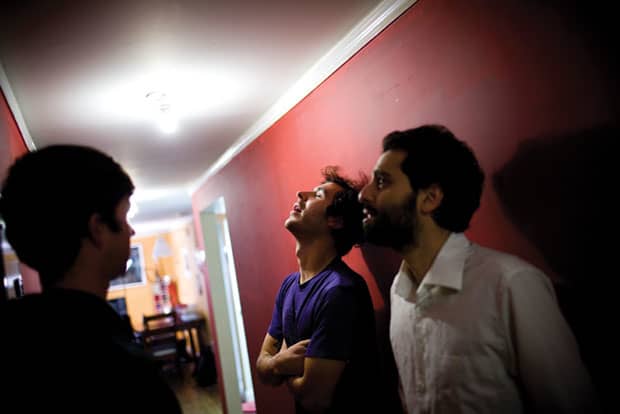Sholi’s robust guitar sweeps and graceful vocals can be as viscerally sweet or raggedly disharmonious as dreams. To write their music, singer/guitarist Payam Bavafa goes deep into his brainspace, pulls out the math and transmogrifies the numbers into lovely, propulsive melodies like he’s Edgar Cayce in an emotional mindspiral. “I worked at a neuroscience institute in Sausalito for this brilliant, mad scientist guy whose idea was to map the process of how thoughts work in a computer model,” says Bavafa. “Certain notions of how memory worked were fun concepts, and some of the elements started to make it in the songs that I was writing.” Brainy music that is actually about how the brain functions, one dizzies at the literalism.
Bavafa has the mind of an electrical engineer and a degree to prove it, but the full-length album he’s made with drummer Jonathan Bafus and bassist Eric Rudd is far from cold academics. Bavafa was influenced by open chords, percussive guitar playing, Pink Floyd and the Persian music he grew up with in his Iranian-American household. (On a 2007 7-inch, Sholi covered Iranian pop star Googoosh’s “Hejrat, ” which Bavafa sang in Farsi.) Deerhoof’s Greg Saunier produced the Bay Area-based band’s self-titled debut after Bavafa sent him a letter asking him to, and while there were already plenty of on-the-spot changes in Sholi’s whirlygig song structures, Saunier’s milkcrate drum aesthetic helped stretch it out like silly putty. “A lot of Persian music is centered around one chord and based in one key. A lot of our songs, at least the ideas, are the same way, but with more dynamics and different elements,” says Bavafa. “I always like to think of a song as just a space for a narrative. In the same way that a film will use editing or lighting or voiceover, all these elements come together to create that picture.”
On the harmonious seaside jam “Any Other God,” Rudd’s drums loll as Bavafa’s bell-clear voice laments lost love, or perhaps sings an anthem to religious acceptance. Its poetics are open to Interpretation, and as Bavafa says, “There are definitely embedded political themes [on the album].” There always are, and anyway there’s no room for over-thinking the point when a song unfolds as heavenly as this one does: punchy drummer-boy hammering on the toms, simple warm chords and Bavafa’s gorgeous tenor so sweet and earnest on the “ooohs.” Some things are just beautiful, and that is enough.
